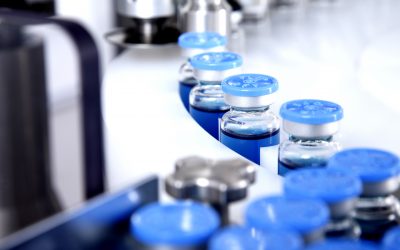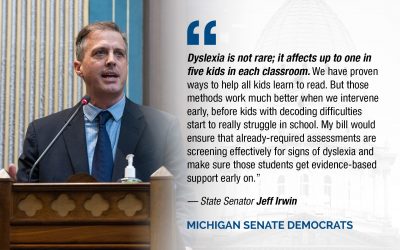Senator Jeff Irwin
We are here to help you!
Whether you have a question about legislation, need assistance navigating government, or simply want to share your thoughts, we are here for you.
Newsroom
Learn what we’re doing for your community.
Bipartisan Senate Acts to Finally Close One-in-the-Nation Immunity Loophole for Faulty Drug Manufacturers
Senate passes Irwin bill to eliminate drug industry immunity, restore justice for victims and families LANSING, Mich. (Oct. 18, 2023) — Today, the Michigan Senate voted 30-8 to overwhelmingly pass Senate Bill 410, legislation sponsored by Sen. Jeff Irwin (D-Ann...
Democratic Legislators Introduce Legislation to Help Students with Dyslexia
LANSING, Mich. (Oct. 5, 2023) — On Wednesday, Sen. Jeff Irwin (D-Ann Arbor), Sen. Dayna Polehanki (D-Livonia) and Rep. Carol Glanville (D-Walker) introduced comprehensive legislation to identify children who show signs of dyslexia and provide evidence-based...
Happy Hour with State Senator Jeff Irwin
Dear Neighbors, Save the date for my happy hour on Monday, October 9th from 6:00 - 7:00 PM! Join me for a drink and updates on my work in Lansing. It's also the perfect chance for you to share your thoughts, questions and ideas. Your input is invaluable in shaping...
Stay Connected on Facebook
Subscribe to my e-newsletter!
Sign up to be the first to know what I'm doing to build a thriving community to fight for you.




This week in Lansing, Republicans voted to cut numerous programs midstream, declaring them all "waste, fraud, and abuse" before later admitting that they were cutting off funding for political leverage, as a "negotiating tactic." They also did this before determining whether there was actually any "waste" or "fraud" and before knowing whether charities, businesses, and local governments had already had spent state money promised to them.
So you can get an idea of what this is about, and why so many people are scrambling to react, here are some of the many specifics.
Republicans cut off funding for child advocacy centers which are places where child victims of sexual abuse are brought to so that they can get access to services and to forensic interviewing which gives them and their families the best chance for justice.
Republicans cut programs to help domestic violence survivors and veterans in shelters.
Republicans cut Wigs for Kids, providing wigs to kids fighting cancer.
Republicans cut funding to help parapros or others working in schools to become certified to teach.
And more.
It was indiscriminate and reckless politics that hurts Michigan. Pettiness and causing chaos to get headlines and leverage is wrong for our future. Let's go after waste, but we really need serious people making these decisions, not people who put partisanship before the public we are supposed to serve. ... See MoreSee Less
718 CommentsComment on Facebook
Michigan Republicans cut funding for kids who are victims of sexual assault, domestic violence victims, and more in a move that pulls back funding from programs that were already approved by the legislature.
The good news is that they're saying this cruel and chaotic strategy is a "negotiating tactic." ... See MoreSee Less
This content isn't available right now
When this happens, it's usually because the owner only shared it with a small group of people, changed who can see it or it's been deleted.6 CommentsComment on Facebook
Today, the Senate passed SB 700 which will stop the Unemployment Insurance Agency from pursuing repayment from people that received pandemic unemployment assistance without any evidence of fraud.
Here's what happened: the UIA has erroneously pursued collections against thousands of residents who received UIA payments legally. UIA has lost time and time again in court because they can't back up their claims of fraud. Nonetheless, they continue to bully and harass residents who committed no fraud. This largely affects gig workers, independent contractors, and low-income workers who were not previously covered by UIA Insurance. Those people are still real people and workers in Michigan, who were sidelined by the pandemic. We need to stop wasting money harassing folks who did nothing wrong.
This bill does not stop the agency from pursuing repayment from people when there is evidence of fraud.
We need to stop this wasteful spending, trying to collect debts not owed; and, stop the ways that UIA is wasting our residents time and money.
www.legislature.mi.gov/Bills/Bill?ObjectName=2025-SB-0700 ... See MoreSee Less
199 CommentsComment on Facebook